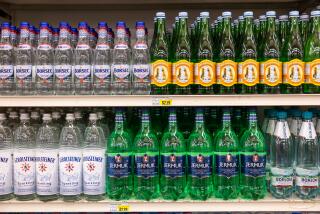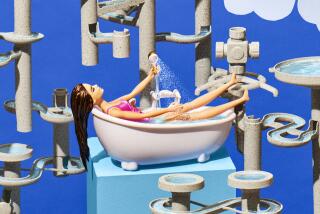Best Summer Cooler: Water Wins Hands Down : Health: It quenches thirst, aids digestion, cools the body, helps to maintain body temperature, carries nutrients to the cells, flushes out bodily wastes and promotes skin tone.
- Share via
When the heat and humidity rise, thoughts turn to a cooling swim in the ocean, a tepid shower or a run through the sprinkler. But the water poured into one’s body is even more important to the cooling process.
Drinking water--eight to 10 glasses a day is the common recommendation--is a necessity year-round. Summer puts a greater emphasis on getting enough fluids, particularly for people living or working in places that are not air conditioned.
Why is water important? It quenches thirst, aids digestion, cools the body during exercise or strenuous work, helps to maintain body temperature, carries nutrients to the cells, flushes out bodily wastes and promotes good skin tone.
“Certainly the majority of the body is made up of water,” says Nancy Gustafson, coordinator of geriatric services for Visiting Nurse and Home Care Inc. in Hartford, Conn. “When we lose water, we are potentially affecting all of the systems of our body.”
The body loses two to three quarts of water a day. When the water in the body is reduced by just 1% of body weight, a person becomes thirsty. A 15% to 20% loss can cause delirium, kidney failure and death.
However, don’t rely on thirst to signal when you need a tall glass of water.
“It can take up to four hours to feel thirsty,” says Rachel Swanson, nutrition education consultant for the New England Dairy and Food Council in Cheshire, Conn. “Someone who is working in the garden or doing some normal activity could work up a sweat and lose four cups of water in an hour. But thirst is quenched after one cup. The bottom line is, thirst is a poor indicator” of the body’s need for water.
The problem is often compounded in two age groups: the very old and the very young.
“I get concerned about older people,” Gustafson says. “The reason is, they don’t interpret bodily sensations as well as a younger person. They won’t feel thirsty as quickly as a younger person. Also, many are on diuretics for high blood pressure or medication that is dependent on the chemical balance in the body.”
Gustafson says that if she visits an elderly patient who seems more confused or forgetful than normal, she considers dehydration as a possible cause. An extra glass of water and a trip, if necessary, to an air-conditioned spot might be all that’s needed to relieve the symptoms.
Like older people, children may not recognize the signs that they need fluids. “Children dissipate more heat, and their body temperature goes up more often than that of adults,” Swanson says. “When children are running around, they don’t cool down as quickly as adults.”
Although a beer or a soda may be more tempting, health professionals recommend another fluid first.
“Water-- aqua pura-- is the best thirst quencher there is, not to mention the least expensive,” says Norma Konefal, a registered dietitian and nutrition consultant to Visiting Nurse and Home Care.
“The homebound would benefit from keeping an ice-filled pitcher of water close at hand and taking a few sips now and then,” Konefal says.
“Infants should be offered fluids regularly,” she says.
The body absorbs water more quickly than highly sugared drinks. “If you drink a glass of water, 15 minutes later 70% has left the stomach,” Swanson says. “If you drink a soda, 15 minutes later 100% is still in the stomach.”
For different reasons, alcohol and caffeinated beverages hinder rather than help fluid replacement. Alcohol, including beer, and caffeine are diuretics that actually serve to rid the body of fluids.
Water, at zero calories, is also easy on the waistline. “Keep a covered bottle in the refrigerator as ‘special water’ for the kids--a treat for adults too,” Konefal says.
Fruit and vegetable juices also are decent fluid-replacers but supply calories--as many as 125 calories for six ounces of cranberry juice cocktail.
“When toddlers asks for juice, give them water,” Swanson says. “Get them trained to like a glass of cold water.”


